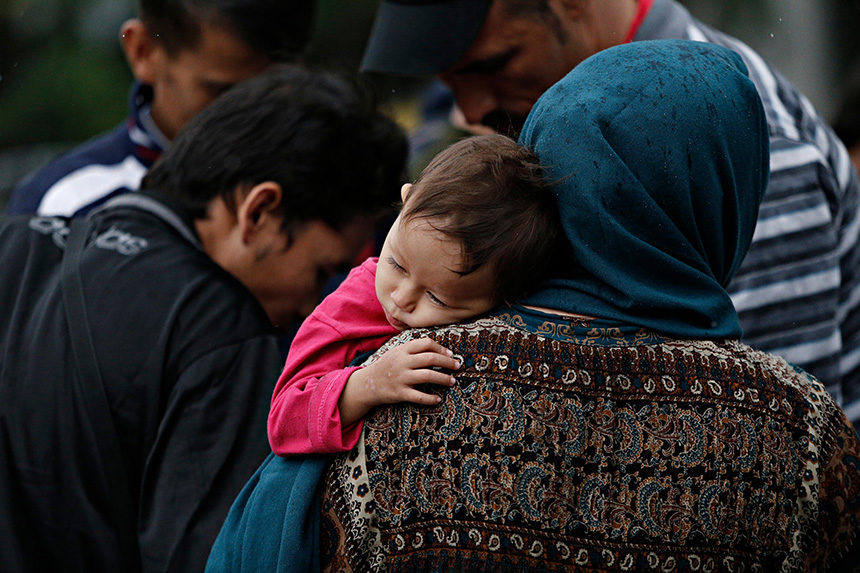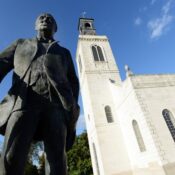In October 2021, I discovered from a newspaper article that up to 150 people who had been whisked from Afghanistan as the U.S. withdrew its troops would be resettled in my hometown of Tallahassee, Florida. My husband and I had recently moved from my adopted city of New York to Florida because of the pandemic, and I was feeling at loose ends. I could relate (in some small way) to being suddenly thrust into a new environment, although the journey of the refugees was obviously more traumatic than mine. I immediately wanted to help.
I called the International Rescue Committee (IRC), the organization overseeing the resettlement in my area and asked how I could help. The agency was happy to set me up as a volunteer, which required a background check and participating in a new volunteer online session. In that Zoom meeting, I learned a short history of the organization and how it assists refugees by securing food stamps and Medicaid, finding appropriate housing, furnishing apartments, helping to arrange employment opportunities, and enrolling children in schools.
The IRC wanted me and other volunteers to go beyond those basics, to offer friendship and help families feel welcome in their new environment. Each volunteer was matched with a family and encouraged to spend time with them weekly. The agency gave us ideas for interactions, such as trips to the zoo, hikes, and English lessons. But ultimately, volunteers had the freedom to determine how to interact and could choose how much or how little to get involved in helping refugee families with their everyday needs.
Most volunteers stick to the IRC script when interacting with refugee families, but I had recently begun working with a local Methodist church and knew I could call on members there to help me welcome my family. So I got permission from the IRC to furnish the apartment of my assigned family, a young man who had worked as an interpreter for the U.S. military, his wife, and their two children, who were both under 3.
I contacted my church for help and within a week had gathered everything the family needed. On the designated day, volunteers pulled into the church parking lot with their trucks. We loaded up a houseful of donated goods and caravanned to the apartment complex. In a few hours of organized chaos, sofas, beds, food, kitchen items, bathroom necessities, toys, and clothes were unloaded, assembled, and moved into place. We filled the fridge with food found on an internet search of “What Afghans eat,” left a generous number of stuffed animals in the kids’ room, and hung a sign on the front door welcoming its new residents in English, Dari, and Pashto.
Several days after the family arrived, I stopped by to ask if they needed anything. Mohammad invited me in, and his pregnant wife, Fatima, brought me some tea, along with a cup of pistachios, dates, and raisins. Fatima was shy and spoke little English, but Mohammad was not at all shy, and he wanted to share stories about his life growing up in Afghanistan. He happily described his schooling, the high-paying job he had held in Kabul, and the joy of gathering with his large family.
But Mohammad’s mood turned dark when he described how the Taliban had taken over his beloved city and how his family had narrowly escaped in a mad dash to the airport. They had been flown first to Bahrain and then to a military post in Virginia before being relocated here.
“My entire family is still in Afghanistan,” Mohammad said as tears filled his eyes. “They’re hungry, out of work, in hiding, scared, and we miss each other so much.”
Mohammad’s story touched me and made me want to do whatever I could to bring joy to this family who had suffered so much. Tallahassee is known for huge, moss-laden oak trees, biking and hiking trails, and picturesque lakes and rivers. But the family was living in an apartment complex in an industrial, run-down part of town, so I made sure to get them to the prettier areas of town. I took them to the city’s main garden, hiked with them on a lakeside trail, introduced them to popular restaurants, and escorted them to our local zoo. Mohammad and Fatima ooh’d and ahh’d at the beautiful landscapes, and the kids giggled with delight at the zoo animals and the ice cream treats.
I visited Mohammad and his family at least once a week for several months, and during that time I got to know other Afghan refugee families who had been resettled into the same apartment complex. So I recruited friends, family, and others from my church to volunteer through the IRC to help these families navigate their new surroundings. Soon my friends were as enthusiastic as I was about this effort, and we began sharing ideas and resources as we navigated the challenges of building relationships across vast language and culture differences.
Language was one of our biggest barriers, as few of the Afghans spoke English. To overcome the communication barrier, we learned to focus on the children, bringing balls, crayons and coloring books on our visits. Kids are the perfect ice-breakers: They appreciate the attention, you can play together without sharing a language, and parents always appreciate love lavished on their youngsters. We also found that the Afghan families were very eager to learn English, and we began to teach them basic words and phrases.
As we got to know our families better, we realized that they often needed transportation to medical appointments, job interviews, and grocery stores. Although Tallahassee has a bus system, it does not run 24/7 and it can be difficult to navigate for newcomers. So we helped them learn the bus system, offered rides when we could, and tried to supply everyone with cheap or donated bicycles.
As awareness of the refugees in our midst grew, a community-wide group was formed to work alongside the IRC. We created a website and a public Facebook group to spread the word about what we were doing, and met monthly to discuss how to help the Afghans get jobs, learn English, navigate our complex healthcare system, and adapt to our school systems. Churches, Temples, Buddhist centers, civic clubs, and community groups got involved. Local media coverage brought more awareness, and offers of help poured in.
The IRC didn’t provide TVs, microwaves, vacuum cleaners, rugs, or computers, so we concentrated on supplying such “most-requested” items. The women constantly asked for sewing machines. I called local fabric stores and sent an email to a local sewing club, asking how I could get my hands on reliable cheap or used machines. Soon, I was drowning in fabric and sewing machines of all sorts, which I distributed to families.
The Afghan families were grateful for the community’s help and for the donations that helped fill their apartments and pantries, but they were even more grateful for the relationships that had grown from these efforts. Whenever we had dropped off donated items or gifts, the families would insist that we come in and sit down so that we could share some food and tea and talk. Even if language was a barrier, their desire to connect was palpable. They wanted to get to know us and to be known. Isn’t that what we all want? To know and be known?
Recently, I had tea with Mohammad and his family, as I’ve been doing regularly since January. Fatima set a tray of pistachios, dates, and raisins and her wonderful chai tea in front of me, and we chatted about our week. Mohammad told me about his awesome new job working in the IT department at one of our local colleges. Fatima discussed her upcoming due date with less assistance needed from Mohammad, showing off her rapidly improving English skills. Their kids tore through the home smiling and laughing, and I smiled and laughed watching them.
I thought back to when I had first met Mohammad and Fatima, when my only goal had been to show one family hospitality. I had never imagined that this family would become such a blessing to my life or that I would become so involved in supporting the burgeoning Afghan community in Tallahassee. I had witnessed the giving spirit of Tallahassee surpass anything I ever imagined, as the community rose up to fill needs of families who had to leave everything behind. But I knew that if I had accomplished nothing beyond my original goal — showing hospitality to one family — that my efforts would still have been worthwhile.
Afghan refugees have been settled in almost every state in the U.S., in towns large and small. Refugees from other countries have been placed throughout our country as well, and Ukrainian refugees may soon be arriving. It’s my prayer that Americans across the country will open their hearts and doors and welcome these new neighbors with hospitality and warmth. You may be surprised to discover how much love and friendship you have to give and how much you’d receive from people who have so recently arrived on our shores.
Featured image: A family of refugees in Victoria Square, Athens, Greece, September 22, 2015. (Shutterstock)
Become a Saturday Evening Post member and enjoy unlimited access. Subscribe now



